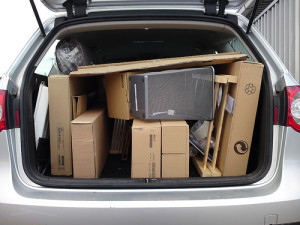 Fall is upon us, and many campuses, are many schools are welcoming another record-breaking number of students. It is a good idea for parents to have a role in the higher education of their children, but what is that role? Are they simply there as pack mules for an over-abundance of clothes and a mini-fridge? Should they take an active role in organizing the room and arranging their daily schedule? For those parents who plan to drop off your student at college, here are a few things to make the trip productive and enjoyable.
Fall is upon us, and many campuses, are many schools are welcoming another record-breaking number of students. It is a good idea for parents to have a role in the higher education of their children, but what is that role? Are they simply there as pack mules for an over-abundance of clothes and a mini-fridge? Should they take an active role in organizing the room and arranging their daily schedule? For those parents who plan to drop off your student at college, here are a few things to make the trip productive and enjoyable.
1. Talk about Expectations.
You may not know what to expect, but that doesn’t mean you won’t have expectations. Remember that your child will also have expectations. Make sure you discuss these expectations before you arrive. Do they want you to spend the night nearby? What role can siblings play (if any)? What is important for them while you are there? Asking good questions will set you to have a successful trip.
After you arrive, remember that their expectations might change quickly. One emerging adult said, “Do your best to read the mood of your child. Know when it’s time to leave (or stay), setting aside personal feelings.” As a parent, you have learned to read your child, and if you are confused ask them.
2. Meet the Suitemates.
While on campus, don’t focus entirely on the work of moving in, but meet those who will be living with your child. If you are bad with names, make a list on your drive home, so when you child mentions their new friends, you will know who they are talking about. This information is invaluable, and will provide a bridge between your worlds.
While meeting these students, one parents said, “Do not make quick judgments about peers on the dorm floor, they are placed there by God for a reason. “ There is a strong desire to share our perceptions and first impressions about those living with your child; however, parents must begin to let go and let them discern and decide who will be in their inner circle (community).
3. Attend and See what you want.
Most colleges offer information sessions for parents as part of their welcoming week. If you want to stay and see a program, that doesn’t mean your child has to go. If you want to take a walk around campus or visit the school cafeteria, your child doesn’t have to babysit you. As parents, it is important that you get a feel of the campus, and what their new life will be like.
4. Pray with them – and pray for them.
Leaving a child at school is big event in your life and your child, commemorate it. Don’t let your final words be repeated sound bytes of your timeless wisdom. One emerging adult said, “I really appreciated that they didn’t give me a bunch of last minute advice about how to live life on my own. I feel like the drop off is not the time or place!” So in order to avoid the last-minute advice, plan to end with a time of family prayer. Find a private space and time to pray with and over your child. Now this will seem weird, if you haven’t built a lifestyle of praying together, but for the spiritually connected family, this is an absolute. Your prayers don’t end with the amen, but that part of parenting goes on forever.
5. Control your emotions
One mother said, “I needed to remind myself that this event is truly not about me, it involved me and caused much change in my life , but was the beginning of the independent journey for my child in God’s plan.” You will face strong emotions, and it is important to keep those emotions in check while with your child, and then process them later in private with your spouse or a friend. One parent said that, “I manage not to dissolve into tears until we exit the parking lot.” Your student wants to know that you love them, but most could do without the public meltdown. One EA writes, “Although I might feel embarrassed if mom starts crying, deep down I feel loved and will cherish it.”
One emerging adult said, “I loved that my parents dropped me off with my stuff (without telling me I had too much stuff), said congratulations, snapped pictures, and took off saying ‘Time to party.’” When asked how it affected them, she said, “It made me deal with the reality that I need to grow up and take responsibility.”
Remember that you are not the only one facing strong emotions. Your children will face a variety of emotions including fear, excitement, joy, and sorrow. As you leave, make sure they know you will be there – no matter what comes their way.
Remember that as you leave their side, God remains.






